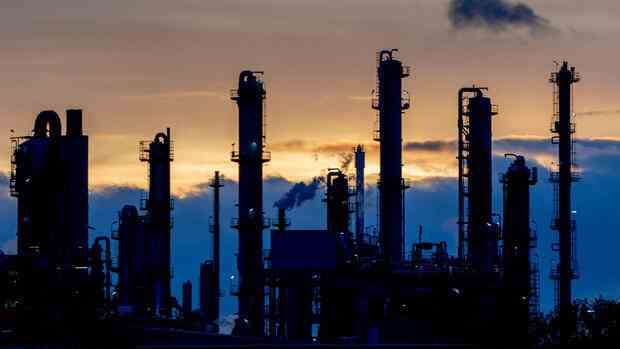In the ongoing business, too, things were rather poor for the chemical company in 2022.
(Photo: AP)
Dusseldorf After months of criticism of its involvement in Russia, the BASF subsidiary Wintershall Dea is now taking action: the oil and gas company announced on Tuesday evening that it would “completely withdraw from Russia”.
“Wintershall Dea will end its activities in Russia. Continuing our business in Russia is not sustainable,” said CEO Mario Mehren after the relevant resolution of the Supervisory Board: “Russia’s war of aggression is not compatible with our values. He destroyed cooperation between Russia and Europe.”
The company will now exit the country in an orderly manner and in compliance with all applicable legal obligations.
Parent company BASF slipped surprisingly into the red last year as a result of this decision. The bottom line is that the chemical company has posted a net loss of 1.4 billion euros. BASF holds around 70 percent of the shares in Wintershall Dea and had to write off its stake by 7.3 billion euros.
For the chemical company, things were rather poor overall last year. Before special items and before interest and taxes, BASF earned around 6.88 billion euros in 2022, a good eleven percent less than in the previous year. Because of high costs, especially in Europe, the Dax group had already announced an austerity program.
Top jobs of the day
Find the best jobs now and
be notified by email.
As a result of the Russian attack on Ukraine, chemical companies had to struggle primarily with the sharp rise in gas prices. Analysts had recently expected a little more operating profit at BASF. Sales, on the other hand, grew by eleven percent to 87.3 billion euros due to higher prices and currency effects.
Close ties between Wintershall Dea and Russia
Wintershall Dea’s withdrawal is highly symbolic. Hardly any other company stands for the close interdependence of the German energy industry with Russian gas production. Wintershall Dea has maintained close partnerships with Gazprom for decades, produces gas in Siberia with the world’s largest gas producer and has a stake in the Nord Stream Baltic Sea pipeline.
The criticism and pressure on the company to withdraw was correspondingly high in the past few months. The company management froze the business relationships, but shied away from a complete farewell for a long time.
In the meantime, however, Mehren apparently no longer sees any future for working in Russia: “In the past few months, the Russian government has restricted the activities of Western companies in the country.” previously been able to work in Russia. “The joint ventures were de facto economically expropriated.”
>> Read here: Wintershall CEO Mehren in an interview with the Handelsblatt
Wintershall Dea deconsolidated the Russian business from financial reporting as of the fourth quarter of 2022. As a result, it will reportedly make a one-off non-cash charge of €5.3 billion. This relates to the Russian joint ventures and write-downs on the investments in Nord Stream AG and WIGA-Transport Beteiligungs-GmbH & Co. KG.
According to Mehren, however, the company has “prepared for this difficult moment” – and has imposed spending discipline, among other things.
With agency material.
More: Why 60 German companies are still active in Russia
